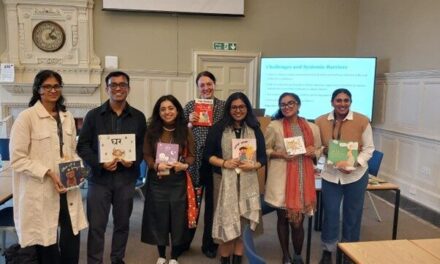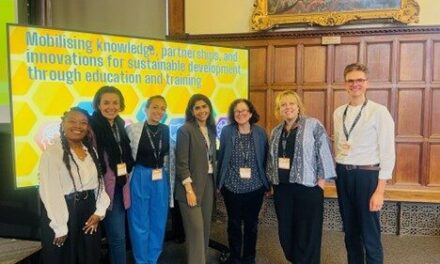This blog was written by Emma Sarton, Cambridge Education and UKFIET 2025 Conference Chair; and Francesca Salvi, University of Nottingham and Deputy Conference Chair.
As we look ahead to the UKFIET Conference 2025 in Oxford, we do so at a critical inflexion point for global education. In a world reeling from intersecting crises – climate breakdown, conflict, economic instability and the erosion of international development infrastructure – the role of education as a lever for sustainable and just futures has never been more urgent. Our conference theme, Mobilising knowledge, partnerships and innovations for sustainable development through education and training, calls for more than reflection: it demands action. It invites us to think boldly, to work differently and to reimagine what educational transformation can look like when driven by genuine collaboration, grounded evidence and values of equity and inclusion. At its heart, this conference is not just about gathering ideas; it is about galvanising a movement.
Click here to review the conference programme
Why this theme and why now?
The global education and international development landscape is shifting rapidly. The closure of USAID, cuts to the UK’s international development budgets, and the growing scale of humanitarian and climate-related emergencies have dramatically reshaped how and whether education is funded, prioritised and protected. In the face of these pressures, education systems are being asked to do more with less, often while navigating acute instability. In this context, the need for sustained, values-driven collaboration has never been clearer. Now is the time to mobilise knowledge, partnerships and innovations that are not only effective but deeply rooted in principles of inclusion, equity and sustainability.
This is why our conference theme insists on the importance of mobilising – not just generating – knowledge. It asks: How can we better connect rigorous evidence with the day-to-day realities of educators, learners and policymakers? How do we centre the experiences and expertise of local actors in both research and practice? And how do we ensure that the innovations we pursue are just, context-sensitive and transformative?
The power of partnerships and evidence
We believe that meaningful, ethical partnerships are at the heart of any sustainable solution. This includes partnerships between researchers and practitioners, across countries and disciplines and between institutions and communities. When built on mutual respect and a clear sense of purpose, these partnerships become powerful engines for change: they can amplify local voices, strengthen systems and deepen impact.
Equally, we must keep making the case for robust evidence – and evidence that people, organisations and governments need and want. In an era of polarisation and funding uncertainty, the legitimacy of education interventions depends on more than good intentions. We need to demonstrate what works, in what contexts, for whom, when and how, while also being honest about complexity, failure and the need for long-term commitment.
What you can expect from this conference
At the 2025 UKFIET conference, we are looking forward to sessions that do more than showcase innovation: the work we will be discussing interrogates it. The research, practice and policy perspectives you will hear about not only explore new approaches but also critically assess their relevance, uptake and long-term potential within shifting global contexts.
Be prepared to see powerful examples of co-produced knowledge, where learners, educators and communities are not just subjects of research but active participants in shaping it. We are especially excited by work that reimagines partnerships, not as one-way transfers of expertise, but as mutual, dialogic spaces that challenge dominant hierarchies and disrupt knowledge flows that have historically sidelined voices from the non-WEIRD contexts (Western, educated, industrialised, rich and democratic contexts).
Contributors will share bold ideas about how education can be delivered and transformed in fragile and low-resource settings, as well as how digital pedagogies might support more inclusive, sustainable learning. We also anticipate thought-provoking sessions on how education interacts with other sectors such as health, climate, livelihoods, and how these intersections can be leveraged to meet the ambitions of the SDGs.
Most importantly, the sessions under the conference theme will ask tough but necessary questions: How can evidence meaningfully shape programming and policy? What does it take to support national and local leadership in system strengthening? And how do international actors need to evolve to act not as saviours, but as allies?
These are not just technical questions; they are deeply political ones. And UKFIET provides a space to tackle them with the honesty, courage, and the shared purpose they deserve.
Looking ahead
At UKFIET, we are animated by values of justice, inclusion and solidarity. We approach education not as a neutral space, but as a deeply political one, capable of entrenching inequality or dismantling it. Our collective challenge is to ensure the latter.
This year’s conference theme is an invitation to think critically and act boldly. We hope the conversations sparked in Oxford about power, responsibility, partnership and practice will not end when the conference does. The real measure of UKFIET’s value lies in what it seeds: new collaborations, strengthened resolve, sharpened ideas, and above all, a renewed commitment to ensuring education systems serve as engines for equity and sustainability, shaping the communities and society we want.
The conference may conclude on 18 September, but we hope its energy, provocations and partnerships will have long legs, shaping the months and years that follow. In a time of fragmentation and uncertainty, UKFIET remains a gathering place where collective insight can lead to collective action. Let’s use it well.
See you in Oxford!




